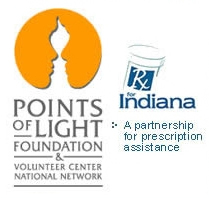Federal and State Resources for Faith-Based Organizations
Churches and other faith-based institutions in Indiana are receiving funding from state and federal agencies in a variety of ways, all with the goal of improving the lives of the citizens of Indiana.
Voucher Programs - These programs distribute vouchers to aid recipients, which can be spent with an approved provider. The best known of these is the Child Care Development Fund (CCDF) administered through the Family and Social Services Agency.
Direct Grant Recipients - An organization directly contracts with a state or federal agency to provide social services. Subgrantee Recipients - A faith-based organization is selected as a subcontractor by another non-profit or an agency with a government contract.
Reimbursement - Many church based schools participate in the school lunch program through the State Department of Education, Division of School and Community Nutrition Programs.
Tax Credits - The Neighborhood Assistance Program (NAP) of the Indiana Housing and Community Development Agency provides $2.5 million in tax credits to Hoosier non-profits to facilitate the provision of needed services. Of the 67 receiving organizations this year, at least 22 are faith-based.
Non-cash assistance - Programs such as Rx for Indiana are a great resource for churches, but don't involve the exchange of contracts or funds.
USA Freedom Corps Participants - Churches and other faith-based organizations are eligible to be service sites for programs of the Corporation for National and Community Service (CNCS), one of three programs administered by USA Freedom Corps.
Restrictions
- Government funds may never be used for inherently religious activities such as Bible studies, evangelism, or preaching.
- Any inherently religious activity must be separate in time or place from a government funded activity.
- Government funded programs must be open to all, without any faith test.
- You do not have to remove religious symbols, or hide your faith. You must respect the boundary of church/state separation, but you don't need to deny who you are.
This is a rapidly evolving area of law. The best suggestion is to develop a clear policy for your organization and have it reviewed on a regular basis.
For more information, please contact Paula Parker-Sawyers, Executive Director for the Office of Faith-Based and Community Initiatives.
- What is the Office of Faith-Based and Community Initiatives?
- Are there grants available from the government specifically for faith-based organizations?
- What is AmeriCorps?
- What is a volunteer center?
- How many people in Indiana volunteer?
- What is Body & Soul?
- How can I become a participating congregation of Body & Soul?
- Join AmeriCorps
- Get an AmeriCorps member for my program
- Find a volunteer opportunity in my area
- Sign up to receive e-Newsletters from OFBCI
- Find out more about other national service programs in my area (Senior Corps, AmeriCorps*VISTA, and Learn and Serve America).
- Connect with other AmeriCorps alumni
- Learn more about Body & Soul
- Become a SHARE Network Indiana member







